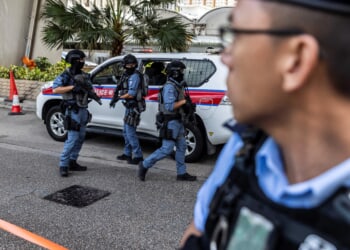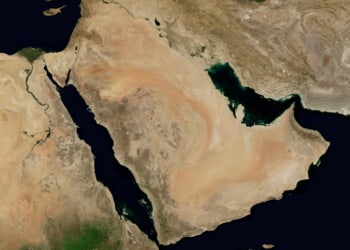
U.S. Senator John Fetterman (D-PA) publicly defended President Donald Trump’s decision to authorize military force against suspected drug smugglers, responding to a recent New York Times article that questioned the legality of the operation.
Fetterman, writing on the social media platform X, highlighted the toll that narcotics trafficking has taken on the United States.
“Overdosing takes 100,000+ American lives every year. Cartels wage this war against our nation everyday. Maybe it’s time for our nation to push back and hold the cartels fully accountable,” Fetterman said.
Overdosing takes 100,000+ American lives every year.
Cartels wage this war against our nation everyday.
Maybe it’s time for our nation to push back and hold the cartels fully accountable. pic.twitter.com/YIOXLT64CD
— U.S. Senator John Fetterman (@SenFettermanPA) September 4, 2025
His comments came after the New York Times published a piece authored by Charlie Savage, which stated that Trump had ordered U.S. military forces to kill suspected drug smugglers on a boat earlier this week.
This Could Be the Most Important Video Gun Owners Watch All Year
The report described the move as lacking “clear legal precedent or basis,” citing specialists in the laws of war and executive power.
The strike targeted members of the Venezuelan gang known as Tren de Aragua, a criminal organization that U.S. officials have designated as “narcoterrorists.”
According to reports, the group was transporting large quantities of narcotics with the intent of bringing them into the United States.
🚨 JUST IN: John Fetterman BACKS President Trump’s evisceration of Venezuelan narcoterrorists
“I fully support confronting the scourge of cartel drug trafficking to our nation.”
This should NOT be controversial! pic.twitter.com/oWx2mOaWiE
— Nick Sortor (@nicksortor) September 3, 2025
The Daily Wire reported that the smugglers were not issued a warning by the U.S. Coast Guard and that there was no attempt to apprehend them.
The outlet noted that, in prior cases, smugglers typically faced limited detention before being released, often with the involvement of non-governmental organizations (NGOs) and advocates who intervened on their behalf.
“Until now, the absolute worst-case scenario is that they might get detained, very briefly, and maybe have to answer a question or two about why they’re heading towards the United States on a boat with four outboard motors and millions of dollars’ worth of narcotics. And then some NGO, armed with tax dollars commandeered by the Democrat Party, would jump into action and spring them loose, as Ivy League academics demanded that we respect the ‘civil liberties’ of sociopathic foreign drug traffickers,” the Daily Wire report stated.
The same report argued that Trump’s decision prevented outside groups, including NGOs and academics, from intervening on behalf of the smugglers.
It added that federal judges were also not given an opportunity to issue rulings that might have delayed or hindered the operation.
The New York Times article sparked debate over the scope of presidential authority and the application of U.S. military force against non-state actors.
Critics argued that such actions raise questions under international law and executive power.
However, supporters of the president’s decision pointed to the designation of groups like Tren de Aragua as terrorists, which, they said, legitimizes the use of military action.
Fully support confronting the scourge of cartel drug trafficking to our nation. pic.twitter.com/wd0QC7eRTL
— U.S. Senator John Fetterman (@SenFettermanPA) September 3, 2025
Fetterman’s remarks underscored a willingness among some Democrats to support stronger measures against international drug cartels, setting him apart from others in his party who have criticized Trump’s approach.
The incident comes amid heightened attention to narcotics trafficking from Latin America and its impact on the U.S. drug crisis.
Federal data shows that more than 100,000 Americans die each year from overdoses, with fentanyl and other synthetic opioids accounting for a significant share of fatalities.
The operation against Tren de Aragua highlights the administration’s expanding efforts to target international drug trafficking networks using military resources.
It also signals an ongoing policy debate in Washington about the extent of executive power in combating narcotics-related threats that originate outside U.S. borders.
The clash between the New York Times coverage and Fetterman’s defense illustrates the sharp divide over how far the U.S. should go in addressing cartel-driven drug smuggling.
For the Trump administration, the operation represents a continuation of its stated policy to treat cartels as terrorist organizations.
For critics, it raises constitutional and international law concerns.
The case is expected to remain a flashpoint as officials in both parties weigh strategies to address the flow of narcotics into the United States.





![ICE Arrests Illegal Alien Influencer During Her Livestream in Los Angeles: ‘You Bet We Did’ [WATCH]](https://www.right2024.com/wp-content/uploads/2025/08/ICE-Arrests-Illegal-Alien-Influencer-During-Her-Livestream-in-Los-350x250.jpg)
![Gavin Newsom Threatens to 'Punch These Sons of B*thces in the Mouth' [WATCH]](https://www.right2024.com/wp-content/uploads/2025/08/Gavin-Newsom-Threatens-to-Punch-These-Sons-of-Bthces-in-350x250.jpg)
![Black BET Billionaire Donor Stuns Democrats, Gives $500K to Winsome Earle-Sears [WATCH]](https://www.right2024.com/wp-content/uploads/2025/08/Black-BET-Billionaire-Donor-Stuns-Democrats-Gives-500K-to-Winsome-350x250.jpg)







